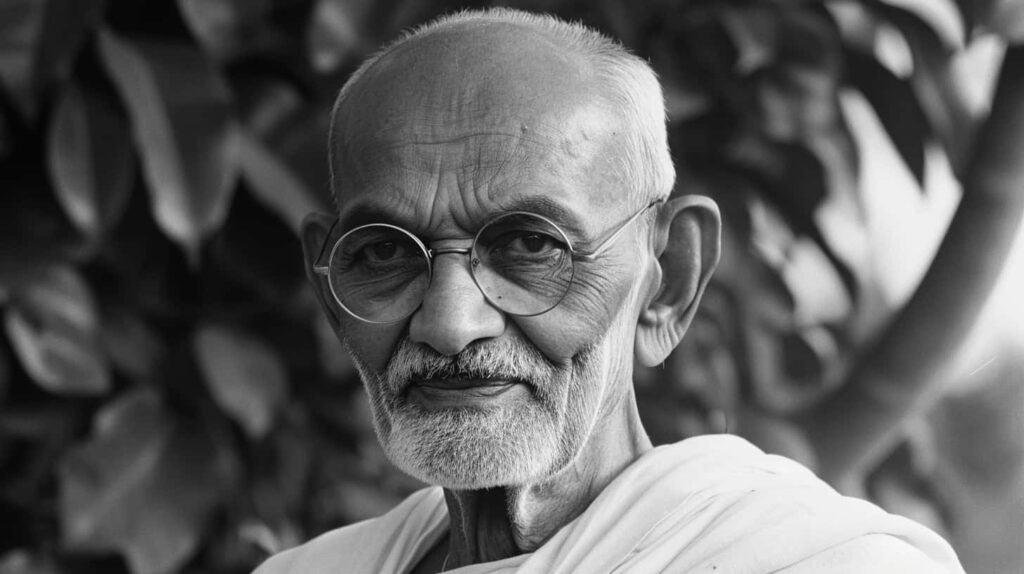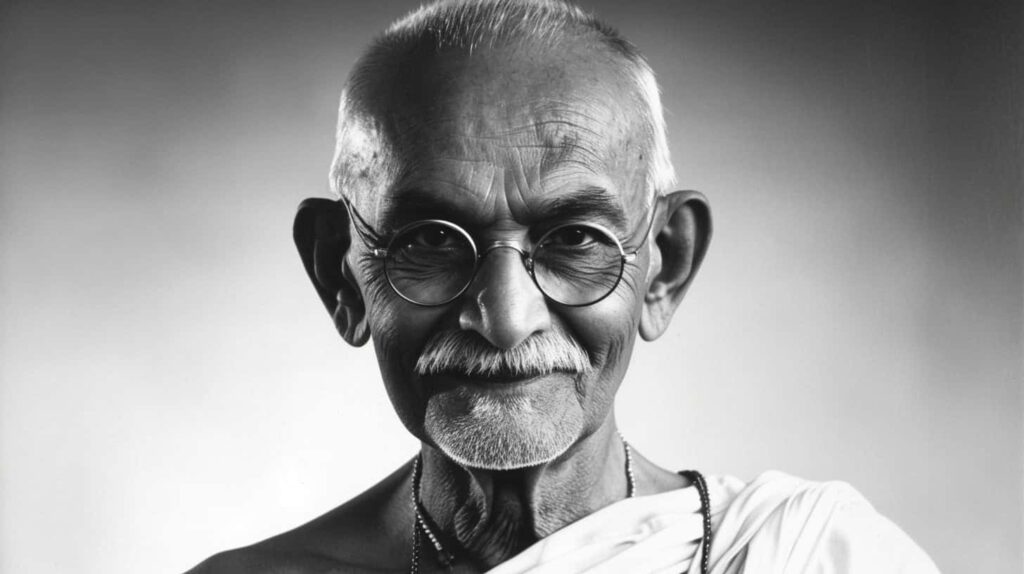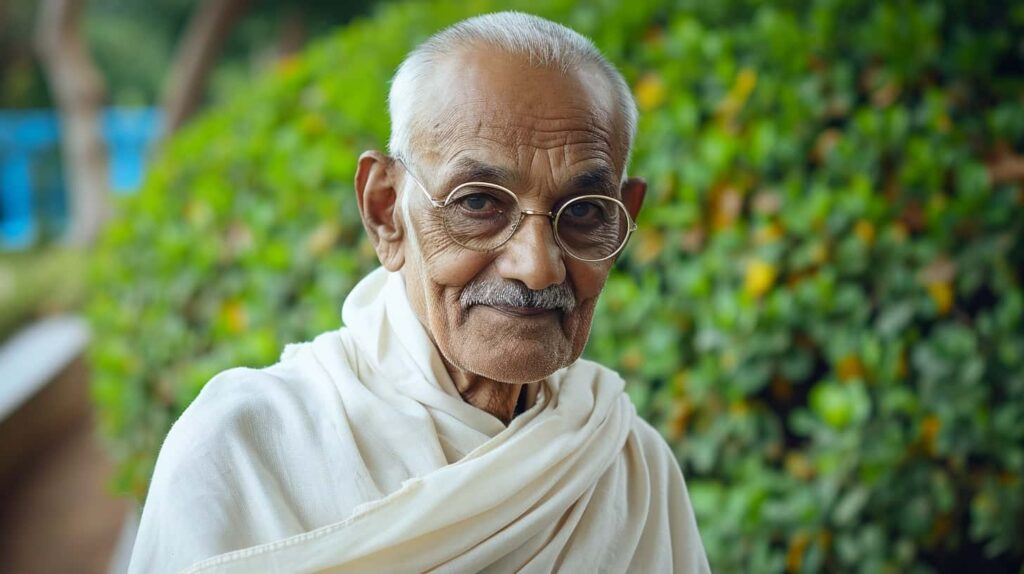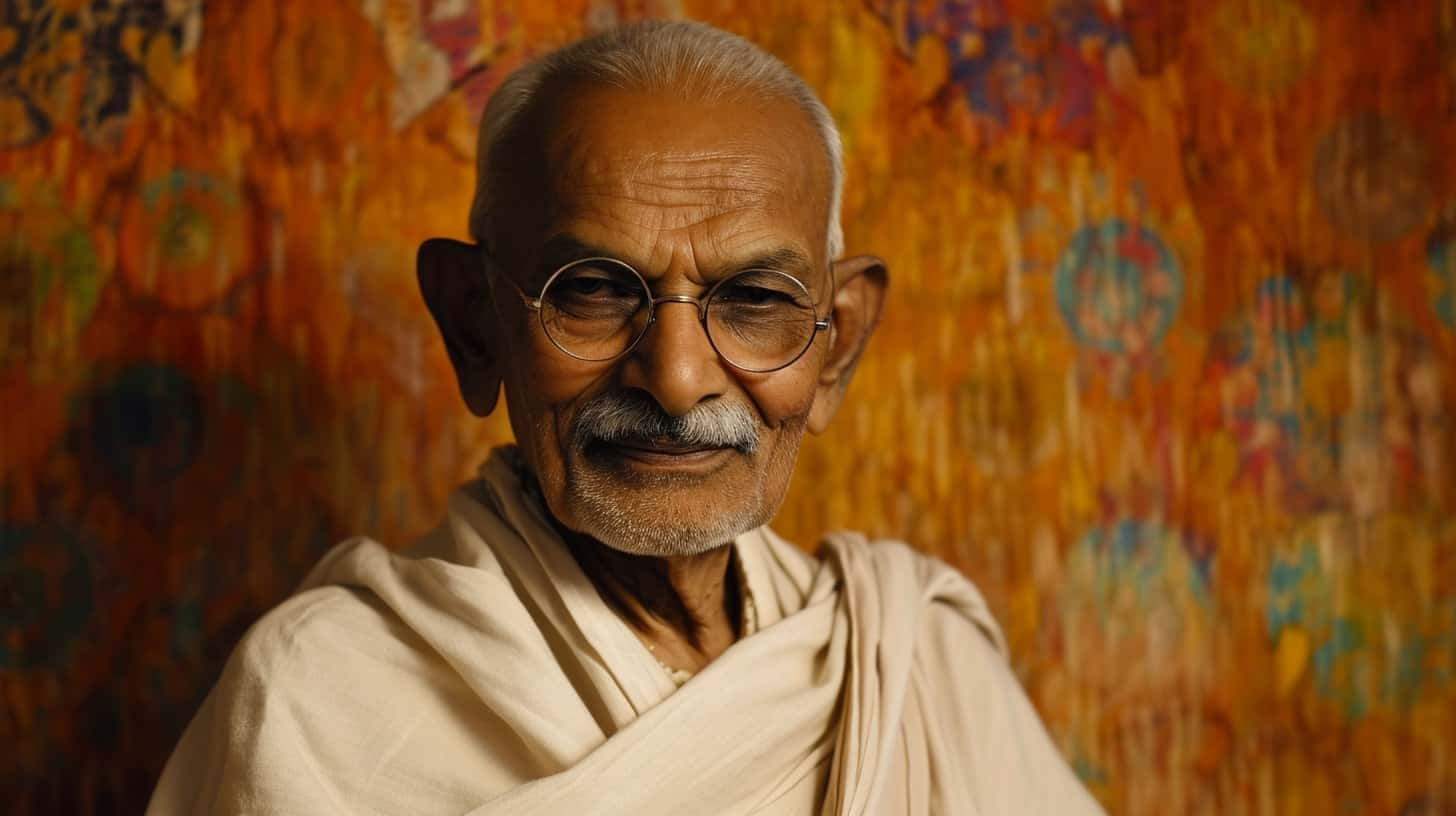As authors, we frequently encounter remarkable personalities whose expressions and deeds create a lasting impact on the globe. Mahatma Gandhi, the celebrated leader of Indian independence, stands as a prime example of such an individual. His quotations serve as a beacon in the shadows, lighting the way towards truth, justice, and harmony.
Through his philosophy of nonviolence, Gandhi showed us the power of peaceful resistance and the strength of unity. His words of wisdom on self-discipline, perseverance, and resilience continue to inspire generations.
As we delve into the world of Gandhi’s quotes, we will explore his teachings on truth, honesty, and the profound impact he had on India and the world.
Gandhi’s Philosophy on Nonviolence
Gandhi’s philosophy on nonviolence, rooted in his deep understanding of human nature and the power of peaceful resistance, has had a profound impact on countless individuals and movements worldwide. His influence on civil rights movements and his approach to conflict resolution are essential aspects of his philosophy that continue to resonate today.
Gandhi’s influence on civil rights movements can be seen in the strategies and tactics adopted by leaders such as Martin Luther King Jr. and Nelson Mandela. Gandhi’s belief in the power of nonviolent resistance as a tool for social change inspired these leaders to advocate for justice and equality without resorting to violence. By promoting peaceful means of protest and resistance, Gandhi showed that it was possible to challenge oppressive systems and achieve lasting change.
Moreover, Gandhi’s approach to conflict resolution emphasized the importance of dialogue, empathy, and understanding. He believed that conflicts could be resolved through peaceful negotiations and that violence only perpetuated a cycle of hatred and destruction. By engaging in constructive dialogue and seeking common ground, Gandhi demonstrated that peaceful resolutions weren’t only possible but also more effective in the long run.
Words of Wisdom on Truth and Honesty
When it comes to truth and honesty, Mahatma Gandhi had a profound understanding of their power and importance.
He believed that truth was a force that couldn’t be ignored or suppressed, and that it had the ability to bring about significant change in the world.
Gandhi also saw honesty as a virtue that should be upheld in all aspects of life, as it formed the foundation of integrity.
The Power of Truth
The power of truth is undeniable, as it holds the ability to transform individuals and societies alike.
In personal relationships, truth plays a crucial role in building trust and fostering intimacy. By being honest with our loved ones, we create a foundation of authenticity and open communication, allowing for deeper connections and understanding.
Moreover, truth is a catalyst for social and political change. Throughout history, leaders like Mahatma Gandhi have shown that speaking the truth can inspire and mobilize masses, challenging oppressive regimes and advocating for justice. When truth is spoken fearlessly, it resonates with people’s hearts and minds, igniting a desire for change and paving the way for a more equitable society.
The power of truth lies in its ability to confront and transform, making it an essential force in personal and societal growth.

Honesty as a Virtue
Honesty, a virtue valued by both individuals and societies, serves as a foundational principle for cultivating trust, fostering authenticity, and promoting open communication. Living truthfully and upholding ethical values are essential aspects of leading an honest life. Mahatma Gandhi, the famous Indian independence leader, believed that honesty was the bedrock of personal and societal growth. He emphasized the importance of integrity and truthfulness in all aspects of life. Gandhi’s words of wisdom on truth and honesty continue to inspire and guide people today. To illustrate the significance of honesty, consider the following table:
| Living Truthfully | Upholding Ethical Values | Benefits |
|---|---|---|
| Builds trust | Ensures fairness | Promotes open communication |
| Fosters authenticity | Upholds moral principles | Enhances personal integrity |
| Cultivates strong relationships | Sets a positive example | Leads to a more just society |
Living With Integrity
Living with integrity requires a steadfast commitment to truth and honesty in every aspect of our lives. Mahatma Gandhi’s teachings emphasize the importance of ethical behavior and integrity in leadership.
According to Gandhi, a true leader is one who upholds high moral principles and acts with honesty and transparency. He believed that leaders should lead by example and inspire others to follow the path of integrity.
Gandhi’s philosophy on ethical behavior emphasizes the need to align our actions with our values and principles, even in the face of adversity. He believed that living with integrity not only fosters trust and respect, but also promotes a harmonious society.
Therefore, it’s essential for individuals in positions of leadership to prioritize ethical conduct and practice integrity in all their actions.
Inspiring Quotes on Peace and Justice
When examining Mahatma Gandhi’s inspiring quotes on peace and justice, we’re confronted with his powerful advocacy for nonviolent resistance as a means to achieve social change. Gandhi believed that peace couldn’t be achieved through violence, and he emphasized the importance of equality and social justice in creating a harmonious society.
His quotes serve as a reminder of the transformative power of peaceful activism and the pursuit of justice for all.
Gandhi’s Nonviolent Resistance
Gandhi’s nonviolent resistance, exemplified through his inspiring quotes on peace and justice, continues to serve as a guiding principle for advocates of social change worldwide. His impact on civil rights and his role in nonviolent protests in history cannot be overstated. Gandhi’s belief in the power of peaceful resistance inspired millions to stand up against injustice and oppression. Through his teachings, he emphasized the importance of nonviolence, truth, and love as the means to achieve lasting change. One of Gandhi’s most famous quotes, “An eye for an eye only ends up making the whole world blind,” perfectly captures his philosophy of nonviolence. This approach has influenced countless movements and leaders, including Martin Luther King Jr., Nelson Mandela, and Aung San Suu Kyi. Gandhi’s legacy lives on, as his principles continue to inspire and shape the fight for justice and equality around the globe.
| Gandhi’s Impact on Civil Rights | Nonviolent Protests in History |
|---|---|
| Advocated for equality and justice for all | Inspired peaceful resistance movements worldwide |
| Fought against discrimination based on race, caste, and religion | Demonstrated the power of nonviolence in achieving social change |
| Led campaigns for Indian independence from British rule | Influenced leaders like Martin Luther King Jr., Nelson Mandela, and Aung San Suu Kyi |

Equality and Social Justice
Gandhi’s profound impact on civil rights and nonviolent resistance extends to his inspiring quotes on peace and justice, which continue to shape the ongoing fight for equality and social justice worldwide. Gandhi’s philosophy of nonviolence was deeply rooted in his belief in social reform and the importance of human rights. His quotes on equality and social justice reflect his dedication to creating a more just and equitable society.
- ‘Injustice anywhere is a threat to justice everywhere.’
- ‘The best way to find yourself is to lose yourself in the service of others.’
- ‘Be the change that you wish to see in the world.’
These quotes serve as powerful reminders of the need to recognize and address social injustices, and inspire individuals to take action in the pursuit of equality and social justice. Gandhi’s words continue to resonate and motivate people around the world to work towards a more just and inclusive society.
Teachings on Self-Discipline and Self-Control
Mahatma Gandhi’s teachings on self-discipline and self-control emphasize the importance of cultivating inner strength and restraint in one’s actions. He believed that true freedom and self-improvement can only be achieved through the mastery of one’s own desires and impulses. Gandhi’s teachings on self-discipline can be summarized in the following table:
| Teachings on Self-Discipline | Key Points |
|---|---|
| Cultivating Inner Strength | Gandhi stressed the need to develop inner strength through practices such as meditation and self-reflection. He believed that by understanding and controlling our own thoughts and emotions, we can better navigate the challenges of life. |
| Practicing Restraint | Gandhi advocated for the practice of self-control and restraint in all aspects of life. This meant resisting the temptation of material possessions, indulgence in pleasure, and aggression towards others. By practicing restraint, individuals can achieve a higher level of consciousness and avoid harming themselves and others. |
| Living a Simple Life | Gandhi encouraged living a simple and frugal life, free from unnecessary possessions and distractions. He believed that simplicity brings clarity of mind and helps in focusing on what truly matters. By reducing our dependence on material things, we can cultivate a sense of contentment and inner peace. |
| Non-Violence | Gandhi’s teachings on self-discipline also revolved around the principle of non-violence. He believed that true strength comes from peacefully resisting injustice and violence. By exercising self-control and choosing non-violent methods, individuals can transform conflicts and create lasting change. |
Gandhi’s teachings on self-discipline and self-control provide valuable insights into the path towards personal growth and enlightenment. By cultivating inner strength and practicing restraint, individuals can lead a more fulfilling and purposeful life.
Quotes on Perseverance and Resilience
After exploring Gandhi’s teachings on self-discipline and self-control, we now shift our focus to his profound quotes on perseverance and resilience. Gandhi’s words on these subjects offer invaluable insights into facing adversity and overcoming challenges with unwavering determination.
- ‘Strength doesn’t come from physical capacity. It comes from an indomitable will.’ This quote emphasizes that true strength lies not in our physical abilities, but in our unwavering determination to persevere despite the difficulties we encounter. Gandhi believed that the power to overcome obstacles comes from within, from an indomitable will that refuses to succumb to adversity.
- ‘The future depends on what you do today.’ Gandhi’s words remind us that our actions in the present shape our future. Perseverance isn’t just about enduring hardships, but also about taking proactive steps towards positive change. It requires us to stay focused on our goals and consistently work towards them, even when faced with challenges.
- ‘In the midst of darkness, light persists.’ This quote highlights the resilience that lies within each of us. Even in the darkest of times, there’s always a glimmer of hope. Gandhi believed that no matter how difficult the circumstances, we’ve the strength to rise above them and find the light that will guide us forward.
Gandhi’s quotes on perseverance and resilience inspire us to confront adversity head-on, refusing to give up or be deterred by challenges. They remind us that true strength comes from within and that our actions today shape our future. With determination and unwavering resolve, we can overcome any obstacle and find the light that will guide us towards a better tomorrow.

Gandhi’s Legacy: Impact on India and the World
One can’t overstate the profound impact that Mahatma Gandhi’s legacy has had on both India and the world. Gandhi’s teachings and philosophy of nonviolent resistance, known as Satyagraha, continue to inspire people across the globe. His influence on global leaders and civil rights movements can’t be underestimated.
Gandhi’s impact on global leaders can be seen in his ability to inspire figures such as Martin Luther King Jr., Nelson Mandela, and Aung San Suu Kyi. These leaders drew inspiration from Gandhi’s philosophy and employed nonviolent methods to fight for justice and equality in their respective countries. Gandhi’s teachings resonated with their own struggles and gave them the courage to challenge oppressive systems.
Furthermore, Gandhi’s influence on civil rights movements extends beyond India. His approach to peaceful protests and civil disobedience has been adopted by various movements around the world. From the Civil Rights Movement in the United States to the anti-apartheid movement in South Africa, Gandhi’s principles have shaped the strategies and tactics used by activists seeking social and political change.
Frequently Asked Questions
What Were Mahatma Gandhi’s Views on Political Independence for India?
Mahatma Gandhi’s views on political independence for India were instrumental in shaping the Indian independence movement. His nonviolent approach and belief in civil disobedience inspired millions to fight for their rights and freedom.
Gandhi’s impact extended beyond India, influencing the civil rights movement in America as well. His teachings on peace, justice, and equality continue to resonate with people around the world, making him a revered figure in the history of independence movements.
How Did Mahatma Gandhi’s Philosophy of Nonviolence Influence Other Leaders and Movements Around the World?
Mahatma Gandhi’s philosophy of nonviolence had a profound impact on civil rights movements and global leaders around the world. His commitment to peaceful resistance inspired countless individuals to fight for justice and equality.
Gandhi’s teachings influenced leaders like Martin Luther King Jr., who adopted his nonviolent approach during the American civil rights movement. Gandhi’s philosophy resonated with people seeking change and continues to shape social and political movements today.
His influence on civil rights and global leaders can’t be overstated.
Did Mahatma Gandhi Ever Face Opposition or Criticism for His Beliefs on Nonviolence?
Opposition to nonviolence and criticism of nonviolent beliefs were indeed faced by Mahatma Gandhi. His philosophy of nonviolence, known as Satyagraha, was met with resistance from various individuals and groups who believed in more forceful means of achieving their goals. Some criticized Gandhi for being naive or ineffective, while others saw his nonviolent approach as a threat to the established order.
Despite this opposition, Gandhi remained steadfast in his belief that nonviolence was the most powerful weapon for achieving social and political change.
What Were Some of Mahatma Gandhi’s Strategies for Promoting Peace and Justice in India?
Gandhi’s impact on civil rights movements and his role in India’s independence struggle were marked by his strategic approaches to promoting peace and justice. He employed nonviolent resistance as a means to challenge oppressive systems and advocate for the rights of marginalized communities.
Gandhi organized mass protests, boycotts, and noncooperation movements, effectively mobilizing the masses to demand change. His emphasis on Satyagraha, the force of truth, inspired countless individuals and remains a powerful tool for social justice movements worldwide.
How Did Mahatma Gandhi’s Teachings on Self-Discipline and Self-Control Impact His Personal Life and Leadership Style?
When reflecting on the teachings of Mahatma Gandhi, it becomes evident that his emphasis on self-discipline and self-control profoundly shaped both his personal life and leadership style.
By embodying these principles, Gandhi was able to maintain a sense of inner harmony and integrity, which in turn inspired those around him.
This commitment to self-mastery allowed him to lead with clarity and conviction, fostering a transformative impact on the Indian independence movement and the world at large.
Conclusion
In conclusion, Mahatma Gandhi’s quotes reflect his deep understanding of nonviolence, truth, peace, justice, self-discipline, and perseverance.
His teachings have had a profound impact on India and the world, inspiring millions to strive for a better future.
By promoting nonviolent resistance and advocating for equality, Gandhi’s philosophy continues to resonate with people today.
Through his words, he encourages individuals to seek the truth, embrace honesty, and work towards a more just and peaceful world.








